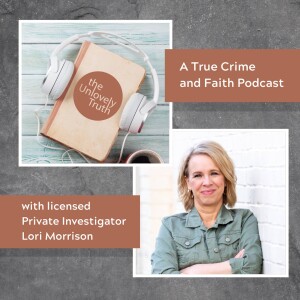
Tuesday Mar 19, 2024
Compassionate Communities: a Key to Crime Reduction, Part Two
Threats of violence didn’t keep Dr. William Cook and his staff from treating the growing number of HIV-positive patients in Austin, Indiana. Their efforts were paying off with more and more people beginning treatment crucial to their short and long-term health. Then the government got involved.
Welcome to another episode of The Unlovely Truth. I’m your host. Join me for another captivating true crime story, where physical, spiritual, and emotional safety takeaways are waiting for us.
We’re wrapping up our deep dive of William Cooke’s fascinating book “Canary in the Coal Mine: A Forgotten Rural Community, a Hidden Epidemic, and a Lone Doctor Battling for the Life, Health, and Soul of the People”. We’ll also talk about ideas for how anyone can be what I call a different kind of P.I. - not a private investigator like me but a person of impact in your community.
Decisions on how to handle the local health crisis started being driven by elected officials rather than trained medical personnel. Of course, the issue of IV drug use that fueled the spread of HIV infections was sharply debated. But the underlying poverty and hopelessness that factored in were mostly ignored. It seemed like the infection itself became the issue, not the well-being of the people who were suffering from its effects.
And very little was being done to address the root causes of the epidemic - domestic violence, generational poverty, a lack of resources, and other things that led to a sense of desperation and hopelessness that fueled the sex work and drug abuse that was spreading the HIV virus. Outside entities were trying to fix a problem they didn’t completely understand.
Situations like this are where local churches can and should step in to do whatever they can. Everyone was going to have to set aside egos and the desire for control to work together if things were going to get any better for the citizens of Austin.
Let’s take a quick look at Parable of the Pharisee and Tax Collector from Luke 18:9-14, and I’m reading from the New LIving Translation:
Then Jesus told this story to some who had great confidence in their own righteousness and scorned everyone else: “Two men went to the Temple to pray. One was a Pharisee, and the other was a despised tax collector. The Pharisee stood by himself and prayed this prayer[a]: ‘I thank you, God, that I am not like other people—cheaters, sinners, adulterers. I’m certainly not like that tax collector! I fast twice a week, and I give you a tenth of my income.’
“But the tax collector stood at a distance and dared not even lift his eyes to heaven as he prayed. Instead, he beat his chest in sorrow, saying, ‘O God, be merciful to me, for I am a sinner.’ I tell you, this sinner, not the Pharisee, returned home justified before God. For those who exalt themselves will be humbled, and those who humble themselves will be exalted.”
I love parables. Words from the mouth of Jesus himself that are often so much deeper than they appear at first glance. The Pharisee thought he was righteous, but his heart was exposed with the self-contered prayer that he prayed. The tax collector knew just how much he needed God’s mercy, so he received it.
But it’s easy to miss the very beginning of this parable - the fact that Jesus boldly told this story to people who were acting just like the Pharisse in the story. He is giving them the opportunity to see themselves in this story and hopefully re-examine the states of their hearts. He is doing the same for us today.
What traditions do we hold onto, like dressing a certain way for church, that we’ve allowed ourselves to believe make us more in tune with God than those who dress differently out of lack of awareness for our custom or lack of resources to dress up at all? When we tell ourselves that certain people don’t measure up to our standards, we forget that without Jesus, none of us can measure up to God’s standards.
SFX
We're going to take a break here at the Unlovley Truth for the next three weeks. A new episode will drop on April 9th, featuring a slightly different format. We’re still going to talk true crime and faith, but instead of using stories that have been written about in books, we’ll be checking out truly contemporary stories in the news right now.
Episodes will be shorter so they will be easy to digest and we will be focusing on crimes in and against our church families. I really believe that greater awareness of what is happening and how we can deal with it by taking proactive and practical steps is so needed in today’s society. I hope you’ll take what you learn and share it with YOUR church family so, working together, we can elevate physical, emotional, and spiritual safety in all our congregations.
Let me know what you think of this episode! Send me an email at lori@theunlovelytruth.com or message me on social media. I love it when people are willing to have those hard, but impactful conversations!
Visit my website to access more episodes, read my blog posts, or check out ways you can financially support the podcast so that together we can impact more people, more families, and more communities. If you would like to contact me about booking me as a speaker, or ask about my consulting services, please email me at lori@theunlovelytruth.com.
Follow me on Facebook, Instagram, and LinkedIn
Check out my Amazon Author Page to find resources on personal safety, and safety training for churches.